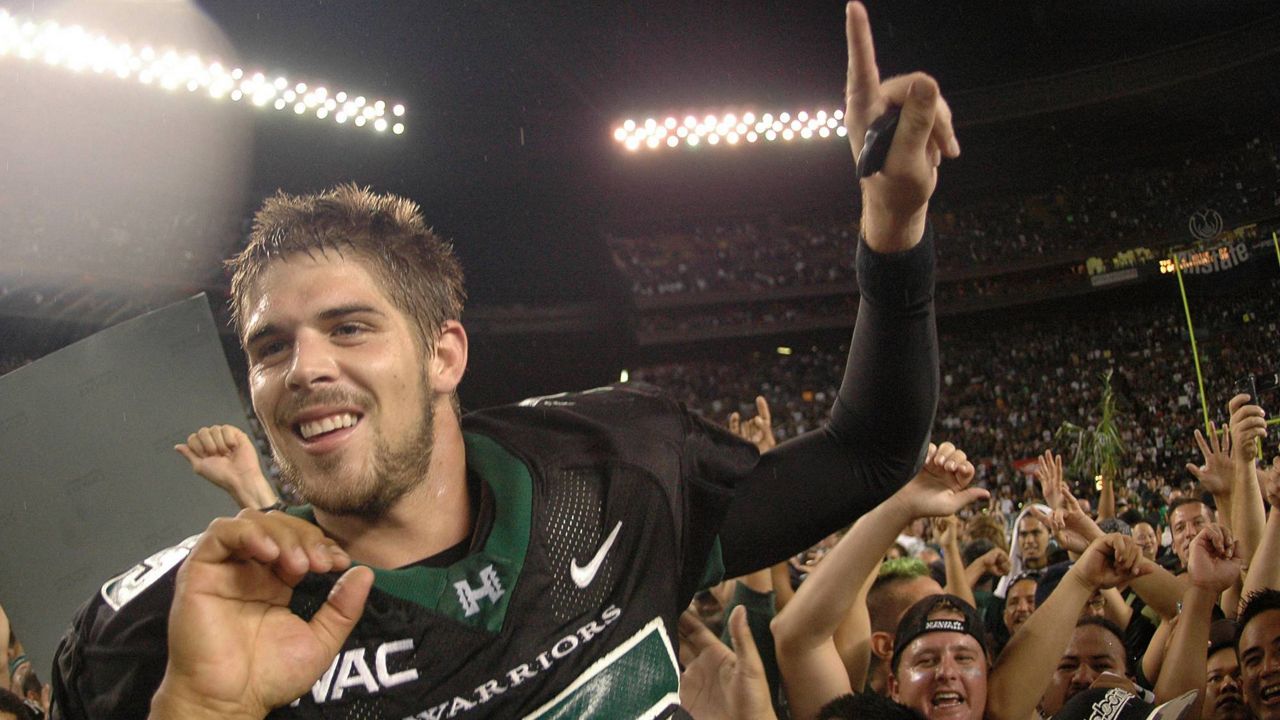HONOLULU — Family and friends of former University of Hawaii quarterback Colt Brennan reacted to the news this week that Brennan had chronic traumatic encephalopathy, or CTE, at the time of his death last year at age 37.
According to a report by Sports Illustrated, Brennan had CTE Stage 1, per an evaluation of Brennan’s brain conducted by Boston University’s CTE Center. Brennan’s parents, Terry and Betsy, had donated his brain for study after his passing due to a drug overdose on May 11.
CTE, a degenerative brain condition believed to be caused by repeated blows to the head, has been found postmortem in numerous former NFL players.
Brennan, besides a football career that took him through a star turn at UH and an NFL preseason opportunity, had a traumatic head-on car accident on Hawaii Island in 2010.
Well-documented struggles with substance abuse followed over a difficult next decade for Brennan.
The Boston University results “identified significant traumatic brain injuries in multiple parts of his brain,” according to Sports Illustrated, though it noted that Brennan’s brain was tougher than usual to analyze because of the nature of his death.
Former UH football assistant coach Rich Miano, who was on June Jones’ staff for Brennan’s Rainbow Warrior playing days from 2005 to 2007, chooses to remember the Brennan that brought joy to the program and state.
Miano, a former defensive back at UH and in the NFL, told Spectrum News that he’s visited Boston University and was tested at the CTE Center, and has followed the issue for a decade.
Miano messaged Spectrum News: “Colt Brennan was Hawaii’s gift from Above. There will never be another player to impact this program in a more positive way!
“The hit he took versus Fresno State and the hundreds of others as a football player, along with the car crash on the Big Island literally changed his life.”
Terry Brennan told KITV that the family’s donation of their son’s brain was with the intent that it could help someone else in the future.
“With Colt passing, there’s no real relief other than the fact that he was dealing with something that he really wasn’t in control of,” Terry Brennan said in the KITV interview. “It created a little easement on our part knowing that he had tried, and even the facilities we put him into … they weren’t prepared to deal with someone with this type of disorder.”
Nate Ilaoa, the former UH running back who is now part of Timmy Chang’s UH football staff as director of recruiting, was a teammate and good friend of Brennan.
He told Spectrum News that in Brennan’s last few years, Brennan remembered some of the stories of their playing days. Other things, he forgot.
Brennan’s CTE diagnosis gave Ilaoa some time to reflect on Friday.
“To kind of know what he was going through, it’s tough because, I still don’t know how you’re able to get through that or get over it, or even make it easier for those who are going through it,” Ilaoa said. “The main thing was, it made me think of him today, the fight that he had throughout. How long he fought, things like that.”
Ilaoa, who earned the nickname “Nasti” for his combination of mobility and physicality at running back, is aware of the stories of CTE that have arisen from the sport. He is all for new developments for player safety and is also for youth football players delaying their start of tackle football until older age.
But for him, there are no regrets about playing the violent game.
“Some people just love the sport,” Ilaoa said. “People ask me all the time, would I do it again knowing (the risks), and I would. I think that’s in anything that we do. There’s a lot of jobs out there as adults as well that are dangerous. But there’s things that people want to do and have to do.”
He said it is important for anyone considering playing football to make that decision themselves.
“Understand what you’re getting into. There’s risks involved, and there always have been,” Ilaoa said. “I think it’s more evident now with some of the studies and things that have been going on. Kids can still play, but it’s good to be aware of some things.”



